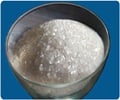High fructose consumption boosts heart problems in teens, report researchers.

Heavy consumers of the mega-sweetener also tend to have lower levels of cardiovascular protectors such as such as HDL cholesterol and adiponectin, according to researchers at the Medical College of Georgia at Georgia Health Sciences University.
These dangerous trends are exacerbated by fat around their midsection, called visceral adiposity, another known risk factor for cardiovascular disease and diabetes. The association did not hold up for adolescents with more generalized, subcutaneous fat.
"It is so very important to provide a healthy balance of high-quality food to our children and to really pay close attention to the fructose and sucrose they are consuming at their home or anyone else's," said Dr. Vanessa Bundy, an MCG pediatric resident. Drs. Bundy and Norman Pollock, bone biologist at MCG's Georgia Prevention Institute are co-first authors on the study published in The Journal of Nutrition.
"The nutrition that caregivers provide their children will either contribute to their overall health and development or potentially contribute to cardiovascular disease at an early age," Bundy said. The best way caregivers can support healthy nutrition is to be good role models, she said. A healthy diet with plenty of physical activity not dieting is the best prescription for growing children.
"Adolescents consume the most fructose so it's really important to not only measure the levels of fructose but to look at what it might be doing to their bodies currently and, hopefully, to look at cardiovascular disease outcomes as they grow," Pollock said.
Advertisement
Fructose, or fruit sugar, is found in fruits and veggies but also in high fructose corn syrup, the sweetener used liberally in processed foods and beverages. Researchers suspect growing bodies crave the cheap, strong sweetener and companies often target young consumers in ads.
Advertisement
The study took a "snapshot" of the adolescents' lives, looking at overall fructose consumption, general diet history and body fat.
"A unique aspect of our study design is that we took into account the fructose released from sucrose during digestion along with the fructose found in foods and beverages," Pollock said. "Because sucrose is broken down into fructose and glucose before it arrives at the liver for metabolism, it is important to consider the additional fructose from sucrose when determining the overall health effect of fructose."
Source-Eurekalert









